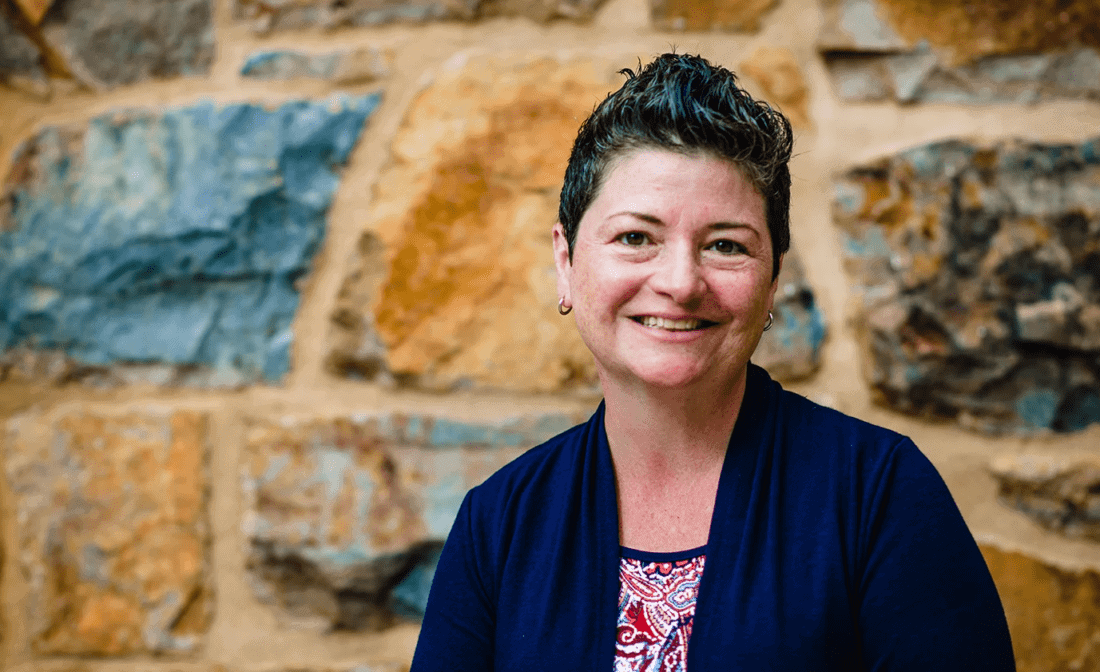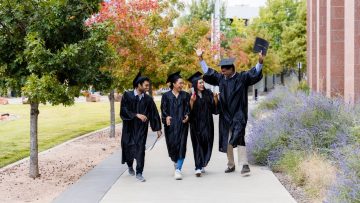More Than Friendly: Marilyn Kelly-Cavotta on Making Moravian College Military Smart
Colleges of Distinction’s mission is to help students from all backgrounds, identities, and experiences find the best well-rounded, inspiring undergraduate education for them. And so, we are excited to further highlight schools that dedicate resources to the service of one of our nation’s most underrepresented populations: service members and veterans of the military.
Institutions with the Military Support Recognition are aware of the unique challenges military students face on college campuses. These institutions are proud to support and cultivate the skills that military students bring to the classroom, all while helping them achieve their personal and professional goals.
Marilyn Kelly-Cavotta is a retired Army Medic who now serves as the Director of Veteran and Military Affairs at Moravian College. In this interview, Cavotta and Ana-Marcela Lopez discuss the importance of advocacy and how institutions can help student veterans overcome obstacles in and out of the classroom.
Ana-Marcela Lopez, Colleges of Distinction: Marilyn, you served in the Army as a combat medic for 13 years and now you work as the Director of Veteran and Military Affairs at Moravian College. Can you tell me a little about your journey to working with veterans in higher education?
Cavotta: Yes absolutely. So I spent 13 years in the army as a medic, and I deliberately wanted to work in the medic side. So I chose to be a medic and did that for 13 years. I was active duty for the national guard here in PA and was deployed over to Iraq and returned home and did AGR. During my AGR, I found out through a medical board that I would no longer be able to be deployed so I went through the medical retirement process. I had just signed another 6 year contract and I was only two years in. I truly had every intention of going through another 20 years, but that was decided for me. While all of that that was happening, I knew that I still wanted to be in a helping profession. Throughout the time I was in the national guard and doing AGR I had been taking classes here and there. At the time of my medical retirement, I had about 126 college credits, which is more than enough for a bachelor’s degree, but I had nothing to show for it. I didn’t have an associates or a bachelors’ or anything, but I had all these college credits.
The fact that I was medically retired allowed me to use vocational rehab money through the VA and I went that avenue to do something and figure out some way to put all my credits to use. So I went to a state college in PA and got my bachelors’ of science in interdisciplinary studies with disciplines public health, psychology and business knowing that all those three played on one another. I went right into a master’s degree in social work. I transferred to Temple University in Philly and got my master’s concentrating on more of the policy and community level, so not really clinical social work. Temple offers the social work degree with two concentration- policy or clinical. Then they have specialization within those. I individualized my specialization to be with veterans and the military because I wanted to continue to serve and since I wasn’t able to do that in uniform I had to reinvent myself to be able to do it in the civilian sector.
All of my research through grad school was about veterans and the military. I did an internship for a program assisting with veterans health. I did another internship working with homeless veterans. Toward the end of that internship I was made aware of a position at Moravian and I was encouraged to apply for it. I ended up getting the position and it’s been perfect for me. It’s been amazing because I’m still helping veterans and service members and we still have members of the National Guard who are still serving. We have an ROTC program where students are preparing to become leaders in the army. I still feel as though I’m still serving even though I’m not in uniform. If I could have written a job for myself it would look very similar to what this is.
Lopez: Military students are some of the most dedicated, hard-working students on campus, yet they face numerous difficulties in and out of the classroom. Why do you think veterans face these obstacles?
Cavotta: That’s a great question. I think it’s because we are so trained, no matter what branch. I can speak from experience in the army, but I see it in other branches. So the way of serving in the military-the training that we go through becomes so deeply ingrained in us that it becomes our way of life. When we come back out of military service and try to transition back to being a civilian, we can’t just forget what we know. I had a friend ask me, “well you were a civilian before you went in why can’t you just go back to being one?” and it goes back to that idea that you can’t unlearn what you’ve learned. So all of that training we’ve gone through and the lifestyle that becomes your life because of the military. We can just walk away from that. Trying to relearn how to be a civilian is something that is often overlooked if you don’t get it and know what it feels like. You can’t always articulate it and they don’t see it. I think that’s the biggest obstacle. We need to focus more on helping veterans transition out of the military and back to civilian life. And if they’re using their education benefits, I am thrilled to be part of that transition.
I have my students come in and they sit down and talk to me saying, “ I just tried to talk to my professor and they got all annoyed at me. And I say, well how intense were you when you were talking to them? What was your posture? And they say “well you know…” and they go back to behaving how they would in the military. I tell them that to civilians that comes across as more intense than what they’re used to and they say “wow I never thought about it that way.” It’s those little nuances that come across to our colleagues and neighbors and professors as more intense than other people.
Lopez: How do you offer the same guidance to the other side? Do you advise faculty staff on how to interact with military students?
Cavotta: Yes absolutely. We started doing more training, and we plan on continuing that visually this semester. I just had a meeting with our adjunct professors who haven’t been here before going over what veteran students want them to know and explaining to them. I’m often an advocate for students to their professors. I go to the professors and say, look I know they’ve been blowing up your email and trying to get an answer, and this is why they’re behaving this way. I know to you it seems that they’re being too demanding, but sometimes in the military you need to get answers right away. Our students don’t know how to step back from that and our professors don’t know how to translate that. Having gone through it myself as a veteran, I try to be the mediator between both of them. I think that’s been very helpful to the whole campus community. It’s been well received on the campus and my position is actually pretty new. I’ve only been here a year but we’ve already received so many compliments on how we’re trying to bridge the gap.
Lopez: What are some “best practices” that you and your team have implemented at Moravian College to help military students achieve success?
Cavotta: We are implementing procedures and policies. For example, in the state of Pennsylvania, as a private non profit school we are not obligated to offer priority registration to military students like the state schools are. I find that odd that it isn’t required because veterans using their GI benefits have a time limit on how long they can use their benefits. There are some exceptions, but generally speaking, students get 36 months of eligibility. Well, being a smaller school, some courses are only offered in the spring or fall semester. If by the time a military student gets to their registration period, that course they need might be filled, and now they have to wait another year which could have huge implications for that veteran student and their VA eligibility. So we submitted a proposal to the president’s cabinet and it was well received. They unanimously denied that offering priority registration was the right thing to do. It’s little things like that. Some campuses that don’t have a director or don’t have an advocate for veterans aren’t really thinking about or aware of small details like that. It makes a big impact on our students. So we’ve been focused on policy and program development like that.
We also developed a student organization for veterans. We are now a formally recognized chapter of student Veterans of America. Having an individual who can focus on the needs of our veterans has been unbelievably important.
Lopez: I appreciate your emphasis on advocating for military students. As I was conducting research for the Military Support distinction, I realized a lack of advocacy was the crux of the issue. Oftentimes, military students lack a dedicated and informed advocate to help them navigate college life. That became the main goal of this badge: to highlight schools that are thinking about these details and making sure that students and their success is put first.
Cavotta: Yeah I like to think of myself as a very strong advocate for our veterans on campus. What I tell them is look, your job while you’re here is to get good grades, see it through the end and walk across that stage. If there are things that are interrupting that, that I can help with, then I will do it. Because I know how it is as a student veteran myself. Most of us are nontraditional age, we have families, we have obligations outside of school, so that can start weighing on you. If a student has a professor who marks them absent while they’re attending a VA appointment, I can speak to the professor on behalf of the student. Being that advocate is important to me. If we were meeting in person, you would see that I’m five feet tall, so a lot of my colleagues call me a little bulldog because of how hard I fight for my students. My students know that if I say I’m going to handle it, it will be handled, so they can go back to studying for statistics.
Lopez: I want to touch on the college search in general for student veterans. Ultimately, Colleges of Distinction is a platform that students can use to find the school that is the best fit for them regardless of how it fits on a ranking list, which as we’ve begun to see, matters less and less. We started this Military Support badge to highlight schools that are actually helping veterans and not just taking their GI money. For military students, the college search is a different experience than that of traditional students. And terms like “military friendly” can be misleading. What are some key factors you would tell military students to keep in mind as they search for the right school for them?
Cavotta: One of the terms we like to use is we aren’t military friendly, we are military and veterans smart. I think there is a huge difference between being friendly and being smart. Friendly is having a welcoming campus, but being smart is doing things like creating my position. Moravian was very deliberate in the screening process. They absolutely wanted to have a veteran in this position, which I think makes a statement in and of itself and distinguishes us as smart vs. just friendly. Because who knows better about how veterans think and act than someone who’s actually done it themselves? So I think that’s important. Students should find out how much their support systems really know about veterans. I’ve been to schools where someone in my position has never served. While they have a passion for veterans, they can’t fully say that they wore the boots and I think that does make a world of difference for veterans. Someone who speaks the language. For me, that is first and foremost the most important thing a veteran should look for when they’re looking for a school.
If the student isn’t feeling supported then they aren’t gonna want to come to campus. It will be one of those experiences where they come to campus for class and immediately leave. We want our veteran students to really be a part of the community. People often think when you serve in the military you can’t have a true college experience, but that’s absolutely inaccurate. You can do both. You could have served in the military for 2 or 8 or even 20 years and still have a true college experience. You’re not going to be a traditional student. You may not live on campus but you can still be involved in campus activities if you have the right support.
This series of interviews features the knowledge, insight, and experiences of military and veteran affairs leaders in higher education. These individuals are paving the way for veterans in higher education through intentional programming, advocacy, and meaningful support. From Green Zone training to strategic partnerships, these campuses are creating spaces where military and veteran students can learn, grow, and succeed.




